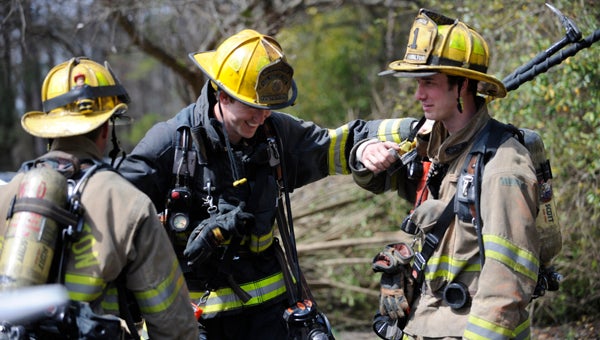Firefighters put old home to good use
Published 7:38 pm Wednesday, March 25, 2015

VAIL STEWART RUMLEY | DAILY NEWS
A BREAK: (Left to right) Firefighters Matt Van Nortwick, Ben Stalls and Brent Hamilton take a breather before heading back into the old Beaufort County Home on Highland Drive in Washington. The abandoned county property was used for Washington Fire-Rescue-EMS’ Rapid Intervention Training this week.
Smoke billowed out of the old County Home Building this week. To passersby it may have appeared to be on fire, surrounded by fire trucks, firefighters and gear. Instead, it was the grounds for Rapid Intervention Training — firefighters going after their own in extreme emergency situations.
“There are times when we need to help ourselves and that’s what this is for,” said Lt. Robbie Taylor. “We’re building and enhancing our skills for getting ourselves — the firefighters — out of danger.”
RIT teams of two ran though two drills: the Denver drill and the Mayday drill. The Denver drill entails rescuing a firefighter from a confined space — a drill that evolved after a Denver, Colo., department was unable to find a way to lift a prone firefighter off the floor and out of a window, what seemed to be a relatively simple task. The Mayday drill is another simulation of an emergency within an emergency, in which a firefighter is either injured or separated from his or her team and other teams are sent in to rescue them.
“It’s been so realistic because we’ve been using real smoke,” said Capt. Johnathan Hardin, who organizes the department’s trainings.
The smoke was produced by dampened wheat straw in metal barrels, creating the same low-visibility conditions found at a live fire, where firefighters would have to rely on radio calls and what’s called a pass tracker to locate and identify a downed firefighter.
All three shifts of Washington Fire-Rescue-EMS, at both stations, were required to participate in the training.





